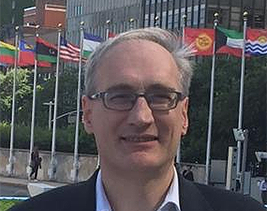Expert Voices
The 2025 STI Forum: A decade of bridging frontier knowledge and policy for global progress

Pioneering scientists and innovators will descend upon New York this month for the UN’s Science, Technology and Innovation Forum. We spoke with our expert, Alex Röhrl, ahead of the Forum about how the Forum has brought together governments, scientists, and entrepreneurs to share new ideas and technology solutions that are making a real difference in fighting poverty, protecting the planet, and improving lives around the world for the past decade.
This year, the Forum is celebrating its 10th anniversary. What impact has the Forum had so far, in leveraging science, technology and innovation to boost progress on the global goals?
“Since its inception in 2016, the UN’s Forum on Science, Technology and Innovation has become the UN’s principal multi-stakeholder hub for bridging science and policy to achieve humanity’s goals and aspirations.
As the flagship annual event of the Technology Facilitation Mechanism, it has reintegrated science and technology discourse into UN Headquarters after decades of absence, catalyzing a wave of initiatives across the UN system. The Forum has brought together governments with thousands of innovators, researchers and entrepreneurs - many new to the UN - stimulating cross-disciplinary, cross-sectoral dialogue.
The Forum has helped surface and scale innovative solutions - ranging from solar-powered health diagnostics to AI for sustainable agriculture. Its science-policy briefs, compiled through global open calls, have addressed frontier areas like synthetic biology, digital public goods and carbon removal.
The Mechanism’s Inter-Agency Task Team now spans 51 UN entities working collaboratively, among others, on capacity-building, including national science and technology roadmaps, and analysis of frontier science and technology developments. Importantly, the Forum fosters inclusivity, with high participation from women scientists and stakeholders from developing countries, ensuring global technological progress is informed by diverse voices.”
What are some of the recent innovations that will help us advance sustainable development and improve peoples’ lives?
“Recent innovations showcased at past Forums offer concrete pathways toward the achievement of our global goals and aspirations. In 2024, youth-led innovations included, among others, inflatable flood barriers for climate resilience, off-grid milk pasteurizers enhancing rural food safety and portable solar-powered air pollution detectors for urban health monitoring.
On the frontier of science, the convergence of biotechnology and AI is enabling “labs-on-a-chip” that democratize access to genomic analysis, empowering community health surveillance and local biotech development - even in resource-limited settings. AI models are now being developed to optimize water use in agriculture, predict crop yields and enable early disease detection in plants and livestock.
Another promising area is sustainable materials. Researchers are developing biodegradable alternatives to plastics using microbes and seaweed. Meanwhile, the miniaturization and affordability of clean energy tech - like low-cost solar panels and microgrids - is helping electrify last-mile communities.
Many of these innovations emerge from the Global South, reflecting the growing strength of distributed innovation ecosystems. The Forum's role has been pivotal in elevating these solutions onto the global stage and connecting innovators with funders and policy platforms.”
During this year’s Forum, there are sessions that connect with major upcoming events to protect our ocean and advance financing for sustainable development. Can you tell us how the Forum connects with these events, and how it also works to help solve some of the pressing issues that these events address?
“The Forum’s 10th session strategically aligns with two major milestones: the 2025 UN Ocean Conference and the Fourth International Conference on Financing for Development. This alignment isn’t accidental - it reflects the Forum’s growing role in broader sustainable development processes. This year’s Forum will have dedicated thematic sessions on oceans and coastal ecosystems and on financing science and technology.
On oceans, the Forum explores science-based innovations for marine protection, from satellite-based fisheries monitoring to ocean-based carbon removal and blue biotechnology. In previous sessions, it highlighted the need for better marine data ecosystems and equitable access to ocean technologies, especially for small island developing States.
On financing, the Forum plays a bridging role, linking innovators with development finance actors. It showcases scalable technologies requiring investment and emphasizes the need for STI-inclusive public finance frameworks. It also builds the case for larger investments in science and technology as catalytic for overall progress, offering co-benefits in health, education and climate.
By convening technologists, policymakers and financiers in one space, the Forum fosters integrated solutions—like financing mechanisms to support community-driven tech innovations or blended finance for climate-smart infrastructure. It operates as a connector, incubator and catalyst across both themes.”
Artificial intelligence is revolutionizing our world. What do you see as some of the actionable pathways for AI to reduce inequalities, promote innovation and empower communities worldwide?
“AI holds immense potential to address global inequalities—but only if deployed inclusively. The STI Forum has emphasized that we must not simply ‘apply’ AI to existing systems but co-design it with affected communities to avoid reproducing biases or exclusions.
Actionable pathways include expanding AI capacity-building in the Global South through open-source tools, partnerships with research institutions and South-South collaboration. Community-driven AI projects—like early warning systems for floods or AI-assisted translation for endangered languages—can enhance resilience and preserve cultural diversity.
Another promising avenue is AI for public services. AI-powered health diagnostics can bring advanced care to remote clinics. In agriculture, AI can empower smallholder farmers with real-time guidance on planting and irrigation, improving yields and incomes.
Crucially, the Forum has called for governance innovation. This includes global norms for ethical AI, inclusive data governance and human rights-based frameworks. It has also advocated for investment in and sharing of AI research and infrastructure and the establishment of interdisciplinary science-policy interfaces to guide responsible AI scaling.
The 2025 STI Forum will continue this momentum, with a special focus on AI, helping policymakers and technologists chart equitable, innovative paths forward.”
For more information visit the STI Forum 2025 website.
 Welcome to the United Nations
Welcome to the United Nations